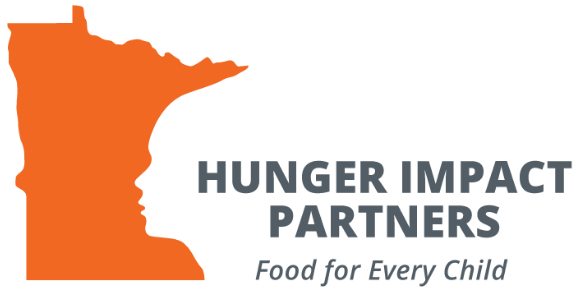REFLECTING ON 2023
FROM: Ellie Lucas, CEO
January 2024
Thank you for your support and commitment to solving child hunger. It was a positive and productive year and your sincere interest in Hunger Impact Partners extends to the lives of many Minnesota children experiencing food hardship.
Since 2015, we’ve successfully helped reduce poverty, strengthened early childhood and student nutrition, and boosted children’s health and development.
We foster community action to change the trajectory of child hunger due to economic and racial disparities by working to remove barriers to federal meal programs.
We meet Minnesota children where they live, study and play—striving to do the greatest good for the greatest number
In 2023 Hunger Impact Partners awarded grants to:
• Twenty-three childcare centers for financial training and record-keeping resources, meal
delivery support, and staffing to increase the number of centers serving meals to 252 total sites serving children birth to 5.
• Support outreach efforts to promote after-school meal program participation and invested in new meal sponsors to add 20 new after-school sites, where 21,500 additional meals were served to school age children.
• Six affordable housing sites, five community libraries, and four faith-based sites to support
summer feeding.
• Crow Wing County to upgrade their community kitchen facilities serving nearly 1,700 low-
income families.
In addition, the Free Meals for Kids mobile app now has more than 35,000 active users operating beyond the summer months with information on meal access throughout the year, food help and resources for struggling families.
We served on the Minnesota Department of Education Nutrition Task Force to create a statewide marketing campaign to eat school meals. It’s called Say Yes to School Meals and is being rolled out across the state this month.
The year 2023 marked the state’s commitment to make Minnesota better at addressing childhood food insecurity. Hunger Impact Partners’ advocacy efforts resulted in several new legislative investments.
• Creating a nation-leading Child Tax Credit predicted to cut child poverty by one-third.
• Funding universal school meals for breakfast and lunch.
• Increasing the Childcare Assistance Program.
• Ongoing state funding support of Early Learning Scholarships for struggling families.
Further, the legislature passed a drastically needed one-time $4 million investment for innovative cross-agency IT projects and $20 million in one-time funding to improve IT systems and processes for programs that impact low-income children and families, including youth, childcare and early learning programs.
Our Child Nutrition Index was the key data source used to drive this investment.
Our mission is to drive systemic, sustainable change in hunger-relief for our 500,000 children living

